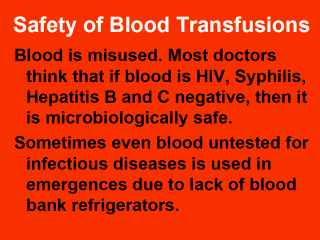| front |1 |2 |3 |4 |5 |6 |7 |8 |9 |10 |11 |12 |13 |14 |15 |16 |17 |18 |19 |20 |21 |22 |23 |24 |25 |26 |27 |28 |29 |30 |31 |review |
 |
In most cases the
donors are the relatives of the patients. For rare blood groups it is usually paid donors, who give the blood.According to Russian medical journal "Transfuziologia" # 5, 2001, the paid donors were source of 27.9% of whole blood taken in Russia in 2000. The paid donors are reluctant to disclose truth about their sickness (could be coupled with false-negative test result) or high risk behavior (the disease cannot be picked up before seroconversion). In Georgia out of 4 970 donors tested 7.3% had anti-HCV (6.9% confirmed), HbsAg was positive in 4.1% (3.4% confirmed), seroprevalence of Syphilis was 2.3%. Three individuals had HIV ("Prevalence of hepatitis B, hepatitis C, syphilis and HIV in Georgian blood donors", European Journal of Epidemiology 17 (7), 2001 p.693-695), the abstract is available at Pubmed. |